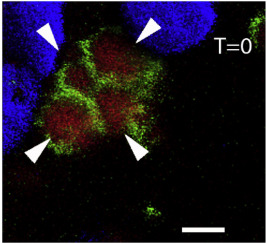Our official English website, www.x-mol.net, welcomes your
feedback! (Note: you will need to create a separate account there.)
Mouse Fat-Specific Protein 27 (FSP27) expressed in plant cells localizes to lipid droplets and promotes lipid droplet accumulation and fusion.
Biochimie ( IF 3.3 ) Pub Date : 2019-08-07 , DOI: 10.1016/j.biochi.2019.08.002 Ann M Price 1 , Nathan M Doner 2 , Satinder K Gidda 2 , Srikarthika Jambunathan 3 , Christopher N James 1 , Alyssa Schami 1 , Olga Yurchenko 4 , Robert T Mullen 2 , John M Dyer 4 , Vishwajeet Puri 5 , Kent D Chapman 1
Biochimie ( IF 3.3 ) Pub Date : 2019-08-07 , DOI: 10.1016/j.biochi.2019.08.002 Ann M Price 1 , Nathan M Doner 2 , Satinder K Gidda 2 , Srikarthika Jambunathan 3 , Christopher N James 1 , Alyssa Schami 1 , Olga Yurchenko 4 , Robert T Mullen 2 , John M Dyer 4 , Vishwajeet Puri 5 , Kent D Chapman 1
Affiliation

|
Fat-Specific Protein 27 (FSP27) belongs to a small group of vertebrate proteins containing a Cell-death Inducing DNA fragmentation factor-α-like Effector (CIDE)-C domain and is involved in lipid droplet (LD) accumulation and energy homeostasis. FSP27 is predominantly expressed in white and brown adipose tissues, as well as liver, and plays a key role in mediating LD-LD fusion. No orthologs have been identified in invertebrates or plants. In this study, we tested the function of mouse FSP27 in stably-transformed Arabidopsis thaliana leaves and seeds, as well as through transient expression in Nicotiana tabacum suspension-cultured cells and N. benthamiana leaves. Confocal microscopic analysis of plant cells revealed that, similar to ectopic expression in mammalian cells, FSP27 produced in plants 1) correctly localized to LDs, 2) accumulated at LD-LD contact sites, and 3) induced an increase in the number and size of LDs and also promoted LD clustering and fusion. Furthermore, FSP27 increased oil content in transgenic A. thaliana seeds. Given that plant oils have uses in human and animal nutrition as well as industrial uses such as biofuels and bioplastics, our results suggest that ectopic expression of FSP27 in plants represents a potential strategy for increasing oil content and energy density in bioenergy or oilseed crops.
中文翻译:

植物细胞中表达的小鼠脂肪特异性蛋白 27 (FSP27) 定位于脂滴并促进脂滴积累和融合。
脂肪特异性蛋白 27 (FSP27) 属于一小类脊椎动物蛋白,含有细胞死亡诱导 DNA 碎片因子-α 样效应器 (CIDE)-C 结构域,参与脂滴 (LD) 积累和能量稳态。 FSP27 主要在白色和棕色脂肪组织以及肝脏中表达,在介导 LD-LD 融合中发挥关键作用。在无脊椎动物或植物中尚未发现直系同源物。在本研究中,我们测试了小鼠 FSP27 在稳定转化的拟南芥叶子和种子中的功能,以及通过在烟草悬浮培养细胞和本塞姆塞姆氏烟草叶子中的瞬时表达的功能。对植物细胞的共聚焦显微镜分析表明,与哺乳动物细胞中的异位表达类似,植物中产生的 FSP27 1) 正确定位于 LD,2) 在 LD-LD 接触位点积累,3) 诱导 LD 的数量和大小增加。 LD 还促进了 LD 的聚类和融合。此外,FSP27 增加了转基因拟南芥种子中的油含量。鉴于植物油可用于人类和动物营养以及生物燃料和生物塑料等工业用途,我们的结果表明,植物中 FSP27 的异位表达代表了增加生物能源或油籽作物的含油量和能量密度的潜在策略。
更新日期:2019-08-07
中文翻译:

植物细胞中表达的小鼠脂肪特异性蛋白 27 (FSP27) 定位于脂滴并促进脂滴积累和融合。
脂肪特异性蛋白 27 (FSP27) 属于一小类脊椎动物蛋白,含有细胞死亡诱导 DNA 碎片因子-α 样效应器 (CIDE)-C 结构域,参与脂滴 (LD) 积累和能量稳态。 FSP27 主要在白色和棕色脂肪组织以及肝脏中表达,在介导 LD-LD 融合中发挥关键作用。在无脊椎动物或植物中尚未发现直系同源物。在本研究中,我们测试了小鼠 FSP27 在稳定转化的拟南芥叶子和种子中的功能,以及通过在烟草悬浮培养细胞和本塞姆塞姆氏烟草叶子中的瞬时表达的功能。对植物细胞的共聚焦显微镜分析表明,与哺乳动物细胞中的异位表达类似,植物中产生的 FSP27 1) 正确定位于 LD,2) 在 LD-LD 接触位点积累,3) 诱导 LD 的数量和大小增加。 LD 还促进了 LD 的聚类和融合。此外,FSP27 增加了转基因拟南芥种子中的油含量。鉴于植物油可用于人类和动物营养以及生物燃料和生物塑料等工业用途,我们的结果表明,植物中 FSP27 的异位表达代表了增加生物能源或油籽作物的含油量和能量密度的潜在策略。









































 京公网安备 11010802027423号
京公网安备 11010802027423号